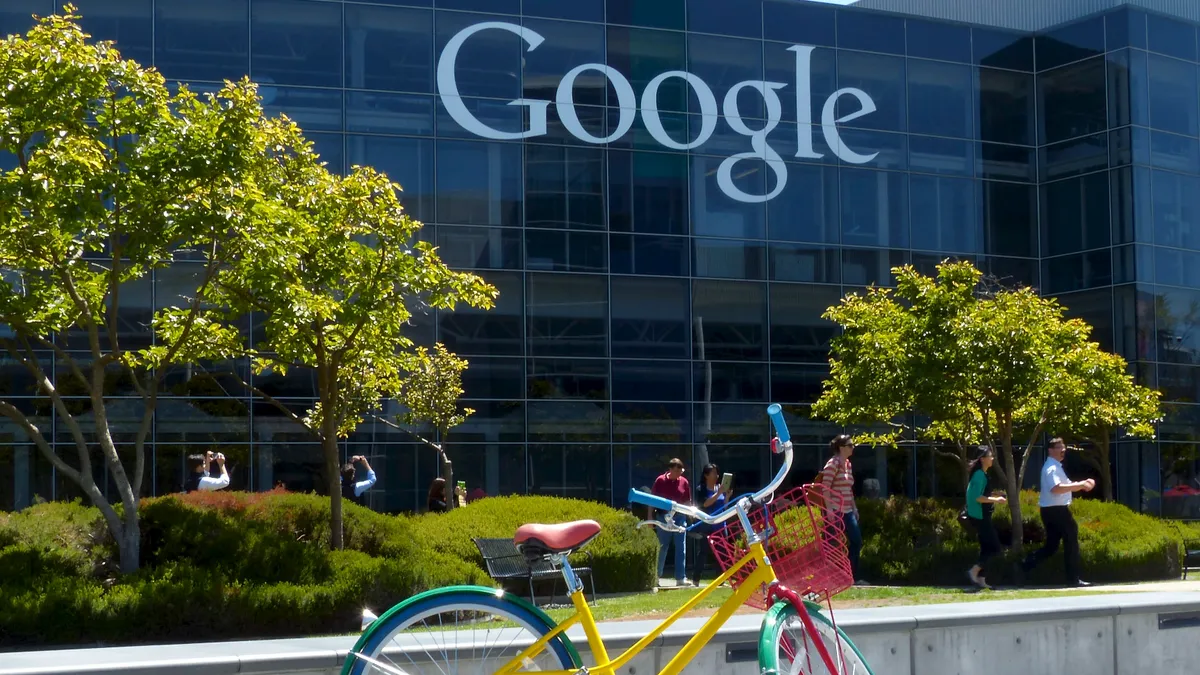Dive Brief:
- Google announced Dec. 15 that Fiona Cicconi, a former AstraZeneca executive, was hired as the next global people operations lead, a company spokesperson told HR Dive in an email. Cicconi will report directly to Alphabet and Google CEO Sundar Pichai when she begins Jan. 5, 2021, the spokesperson said. The current head of people operations, Eileen Naughton, announced in February her plans to step down from the position, but remained due to the COVID-19 pandemic, according to the company. Naughton and her team "stepped up, putting the wellbeing of Googlers and our extended workforce first," the spokesperson said.
- In 2021, Cicconi will be at the helm to oversee Google's experiment with a flexible work week pilot — a hybrid model in which teams meet for "collaboration days" in the office, and have the choice of spending the other days working from home or the office, the spokesperson said. In addition, Google has extended its voluntary work-from-home option until Sept. 1, 2021.
- At AstraZeneca, Cicconi was the executive vice-president of human resources. Through her roles at AstraZeneca, GE, Cisco and Roche/Genentech, Cicconi has experience in HR processes, promoting diversity and inclusion and designing organizational change, the spokesperson said.
Dive Insight:
Cicconi's experience in the "management of large global workforces and international teams will be invaluable" to continue the work Google's people operations team began at the start of the pandemic to assist employees, according to the spokesperson.
Programs Google implemented included carer's leave, which allows caregivers to take up to 14 weeks of paid time off to fulfill other caregiving responsibilities. A work-from-home stipend to expense necessary equipment and office furniture, global reset/recharge days and mental health resources were also offered to employees, according to the company.
But Cicconi will begin her position managing Google's expansive workforce amid controversy surrounding the termination of a prominent researcher at the company.
Timnit Gebru claimed she was ousted from her position as co-lead of Google's ethical AI team over a paper she co-authored that examined bias in artificial intelligence. Gebru, an artificial intelligence scholar who works on algorithmic bias and data mining, said she was terminated after pushing back on the company's censorship of the research paper, and she also felt targeted.
"My theory is that they had wanted me out for a while because I spoke up a lot about issues related to Black people, women and marginalization," Gebru told NPR's Morning Edition. Alphabet and Google CEO Sundar Pichai sent a memo to staff Dec. 9 stating he would launch a review of the circumstances surrounding Gebru's departure from the company as "it seeded doubts and led some in our community to question their place at Google," according to CNBC. Pichai apologized and said he'd work to restore employees' trust.
The head of Google AI Jeff Dean expressed to Google Research colleagues in an internal email Dec. 3 that Gebru's paper had "some important gaps that prevented us from being comfortable putting Google affiliation on it" and it "didn't meet our bar for publication."
Unless Google met a number of conditions, Gebru said she would resign from her position, and the company was unwilling to meet the terms, according to Dean. Gebru said on Twitter Dec. 2 that she did present Google with conditions in regard to the research paper. "If you can meet them, great, I'll take my name off this paper, if not, then I can work on a last date [of employment]," she wrote. However, an email was sent to her direct reports indicating that she submitted a resignation, but she hadn't resigned, Gebru said. I "asked for simple conditions first, and said I would respond when I'm back from vacation," Gebru said on Twitter.
A Dec. 3 open letter to Google Research leadership, signed by more than 2,000 employees, said Gebru "faced defensiveness, racism, gaslighting, research censorship, and now a retaliatory firing." The employees demanded transparency to the broader public, an explanation of why the paper was "unilaterally rejected by leadership," and a commitment to academic freedom and research integrity.













